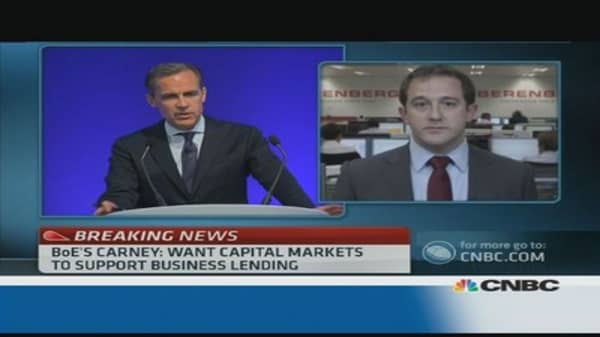The Bank of England (BoE) would consider injecting fresh stimulus into the U.K. economy, if rising bond yields threaten its recovery, Mark Carney said in his first official speech as governor.
Carney also stressed that he did not expect the rate of unemployment to fall to 7 percent — the level at which the BoE said it would consider raising interest rates — quickly.
The BoE had hoped this "forward guidance" policy, outlined at its inflation report earlier this month, would cap bond yields. Instead, gilt yields have climbed to multi-year highs and the pound has appreciated against the dollar, as signs of an improving economy boosted expectations that unemployment could fall faster than the bank expects.
(Read more: Don't bet on it: Gamblers take on central bank forecasts)
"The upward move in market expectations of where bank rates will head in future could, at the margin, feed into the effective financial conditions facing the real economy," Carney said on Wednesday in Nottingham, England, at an event hosted by the local Chamber of Commerce.
"The MPC [Monetary Policy Committee] will be watching those conditions closely. If they tighten, and the recovery seems to be falling short of the strong growth we need, we will consider carefully whether, and how best, to stimulate the recovery further."
In the lead up to Carney's speech, sterling came under pressure, slipping to around $1.5448, before sharply climbing to $1.5533 later on Wednesday. Yields on U.K. Gilts also rose across the board, with the interest rate on 10-year notes rising to 2.82 percent.
(Read More: BoE split on forward guidance;unemployment steady)
Carney outlined three reasons why the BoE did not expect the unemployment rate to fall from its current 7.8 percent to 7 percent for "some time".
First, growth prospects were "solid not stellar," he said. "Second, a great many jobs need to be created to bring unemployment down... Third, a recovery in growth does not necessarily mean faster job creation and lower unemployment."
He also stressed that interest rates would not automatically be raised when unemployment hit that level. "The 7 percent threshold is instead a staging post along the road to recovery. When unemployment reaches 7 percent, the MPC will reassess the state of the economy and the appropriate stance of monetary policy."
'Not a whole lot new'
Rob Wood, U.K. economist at Berenberg Bank, told CNBC there was nothing surprising in the speech.
"He was about a dovish as he could be… So there's not a whole lot new there – but equally there's not a whole lot new he could offer today," Wood said. "The real problem he has got is that the 7 percent threshold he set is really not very far away from the 7.8 percent unemployment rate that we have got now... It's not hard to imagine scenarios in which that 7 percent target is hit sooner."
The speech was more neutral than many had expected, according to Kathleen Books, research director at Forex.com
"Although he said that the bank would inject fresh stimulus into the economy to keep market interest rates low, the market is questioning: what are low market interest rates with the economic recovery in full swing? Could the U.K. economy cope with a 3 percent yield on the 10-year Gilt?"
She added: "Carney is only one man on the BoE. He didn't manage to get everyone voting for forward guidance - QE [quantitative easing] could be a hard sell also."
Minutes of the last MPC meeting revealed that members were divided over plans to introduce forward guidance, with external MPC member Martin Weale voting against the policy.
Lending boost?
Carney also announced more relaxation of the rules faced by Britain's banks and building societies, in an effort to boost lending and, in turn, economic growth.
(Read more: BoE's Carney set to hit back against skeptical markets)
Under the new plans, the U.K.'s largest eight banks would be able to reduce their required liquid asset holdings by a total of £90 billion ($139.86 billion) if they reach the 7 percent minimum capital requirement.
The Institute of Directors (IoD), a business lobbying group, said Carney's speech was reassuring.
"We welcome the decision to help healthy banks increase the supply of credit. Lending to businesses remains essential as the economic recovery continues," Simon Walker, director general of the IoD, said.
"We share the governor's cautious optimism about the strength of the recovery, but he is also right to warn that growth will not miraculously translate into falling unemployment. Tackling this issue will take time, but our members will be relieved that rates will remain low while efforts to create jobs continue."
—By CNBC's Katrina Bishop. Follow her on Twitter @KatrinaBishop





